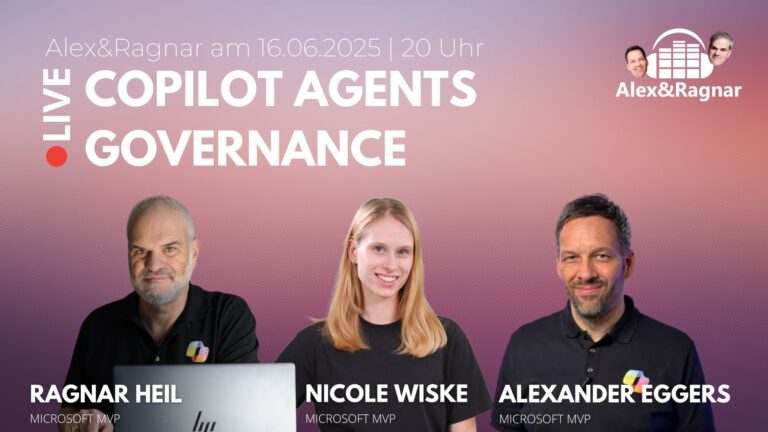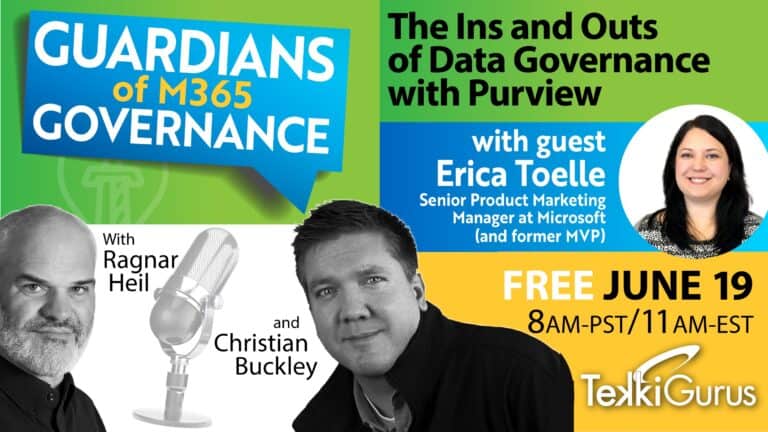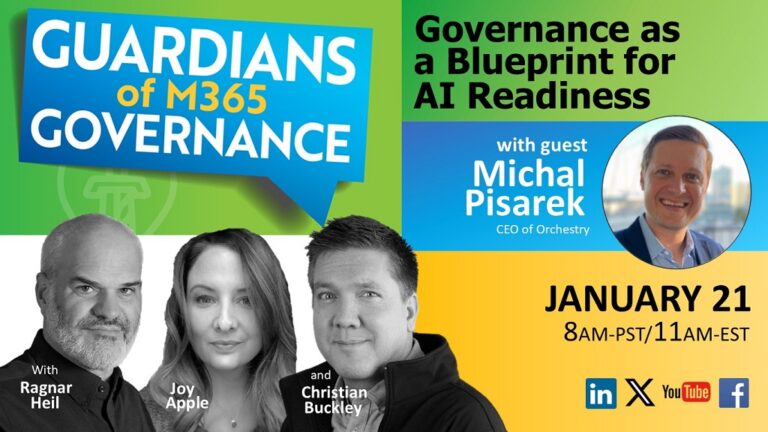From Excitement to Enforcement: The Reality Check Every Copilot Deployment Needs
Sometimes the most important conversations happen after the confetti settles and the demo screens go dark.
The Honeymoon is Over
I just finished recording the latest “Guardians of M365 Governance” episode, and honestly? It felt like sitting in on a therapy session for IT professionals. Joy Apple, Christian Buckley, and Diego Silva weren’t pulling any punches about what happens when the initial Copilot excitement fades and reality sets in.
You know that moment, right? When leadership stops asking “What can AI do for us?” and starts asking “Why is our search still terrible?” or worse, “Why did our sensitive data just show up in a Copilot response it shouldn’t have?”
The Uncomfortable Truth About Governance
Diego Silva dropped what might be the most honest line I’ve heard in months: “There’s no point in creating a plan for rolling out agents when your SharePoint sites are still a mess.”
Ouch. But also… exactly.
Here’s what I’m seeing in organizations everywhere: We’re so excited about the shiny new AI capabilities that we’re building on foundations made of digital quicksand. Network drives mixed with OneDrive, documents with names like “Final_FINAL_v2_ACTUALLY_FINAL.docx,” and SharePoint sites that look like they were organized by someone having a particularly chaotic day.
The Version Control Nightmare
One thing that really hit home from the discussion was the versioning problem. Copilot is only as smart as the content you feed it. If you’re loading an agent with ten similar documents that are all slightly different versions of the same thing, you’re essentially teaching AI to be confused.
Think about it: Would you ask a new employee to make decisions based on a pile of documents where you can’t tell which one is current? Then why are we doing exactly that with our AI agents?
The Cultural Challenge
What struck me most about the conversation was Diego’s point about cultural change. You can’t just train people for a few hours to be “Copilot ready” and call it done. This isn’t a campaign – it’s a fundamental shift in how we think about information.
The “Everyone Except External Users” Problem
Christian brought up something that made me wince in recognition: the overuse of the “Everyone except external users” group. Microsoft is already suggesting organizations stop using it, and we all know what that means. When Microsoft “suggests” you stop doing something, you’ve got maybe six months before they make the decision for you.
But here’s the thing – this isn’t really about that specific group. It’s about our tendency to default to “share with everyone” instead of thinking about who actually needs access to what.
Practical Steps Forward
So what do we actually do about this? The conversation offered some genuinely practical advice:
1. Stop Saying “Copilot Readiness”
Diego’s approach of reframing the conversation around “securing our information” rather than “Copilot readiness” is brilliant. It removes the political baggage and focuses on the real issue: information governance matters regardless of what tools you’re using.
2. License Based on Usage, Not Job Titles
This one’s going to ruffle some feathers, but it’s necessary. Create review cycles. If someone isn’t using their Copilot license, reassign it. Yes, it feels harsh, but resources are limited and impact matters more than hierarchy.
3. Build User Communities, Not Just Training Programs
The most effective adoption happens when users share discoveries with each other. Set up regular brown bag sessions where people can share their favorite prompts and use cases. Make it peer-to-peer, not top-down.
4. Focus on the Basics First
Before you build that amazing agent that summarizes your emails, make sure your document management doesn’t look like a digital hoarder’s paradise. Archive old content. Use proper naming conventions. Clean up your SharePoint sites.
The Daily Reality
Here’s what really resonated with me: governance isn’t a project you complete. It’s a daily practice. It’s like maintaining a garden – you can’t plant it once and expect it to stay beautiful forever.
The most successful organizations I’ve seen treat governance like operational excellence. They have dashboards showing how many documents they’ve archived each month. They track search performance. They measure the quality of Copilot responses and iterate based on what they find.
Looking Forward
The conversation reminded me why I love working in this space, even when it’s frustrating. We’re essentially teaching organizations how to think differently about information. We’re helping them build habits that will serve them well regardless of what new technology comes next.
And honestly? That’s more important than any individual AI feature.
The organizations that get this right – that build strong information governance practices alongside their AI adoption – those are the ones that will actually realize the transformative potential of these tools. The rest will just have very expensive ways to surface very messy data.
The Bottom Line
Copilot isn’t going to fix your content problems. It’s going to make them more visible.
The question is: are you ready for that level of transparency about how your organization actually manages information? Because ready or not, that conversation is coming.
What’s your experience been with the transition from Copilot excitement to the reality of governance? I’d love to hear your stories – the good, the bad, and the “we definitely should have thought about that first” moments.
Want to dive deeper into Microsoft 365 governance? Check out the full “Guardians of M365 Governance” series – it’s the kind of honest, practical discussion this space needs more of.
Talk to us at HanseVision about your requirements and questions about M365 Governance, Copilot (Studio) and Agents Governance!
Find my Calendar here and check out our OnePager about M365 Governance.
Listen to this episode with your favorite Podcast Player like Spotify:






